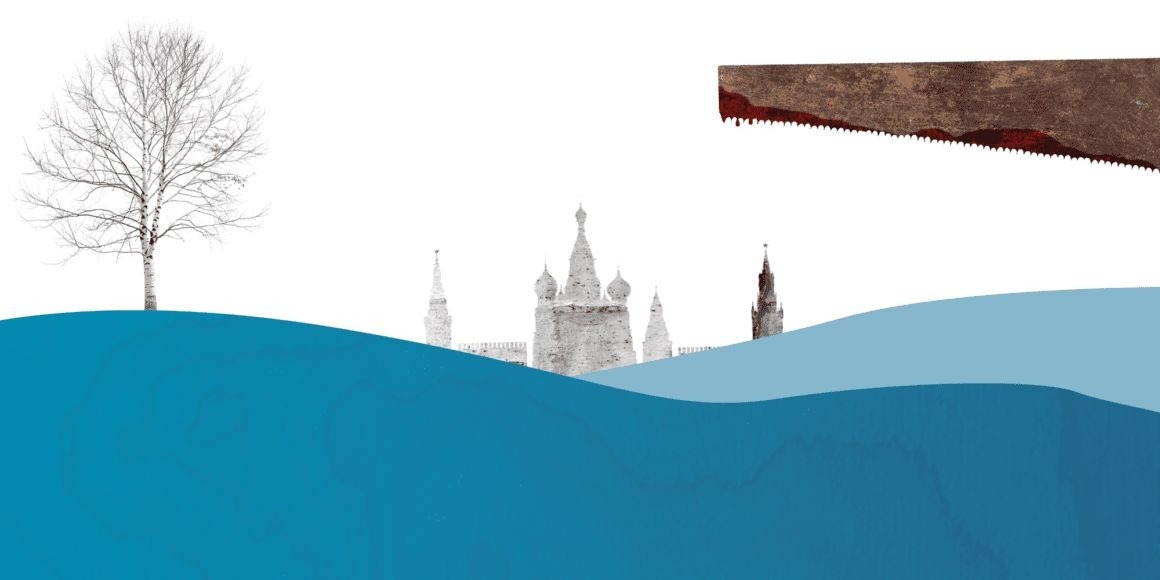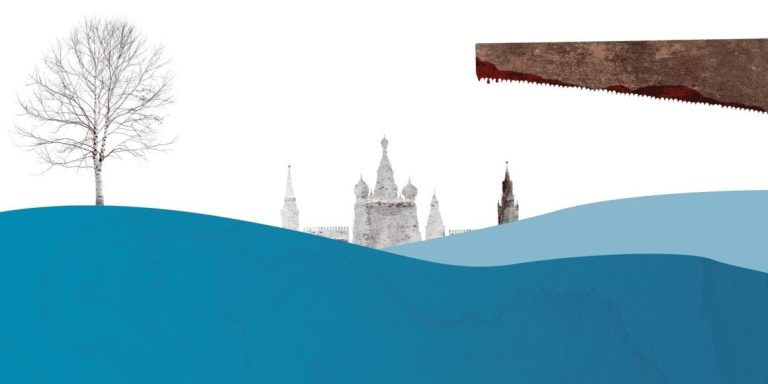In collaboration with the iFact media
Illustration: Lenka Matoušková 2025-09-29
In collaboration with the iFact media
Illustration: Lenka Matoušková 2025-09-29
Before Russia’s full-scale invasion of Ukraine, the Czech company Orlimex was one of the largest importers of Russian birch plywood in Europe. Today, Russian timber is under sanctions, and the import of products made from it is formally banned in the EU under the European Timber Regulation. Yet loopholes in the EU’s complex legal framework still allow Russian birch to reach European markets—rebranded and rerouted through intermediaries in countries such as Kazakhstan and Georgia. According to a recent warning from the European Commission, products made from Russian wood are still likely ending up in Czech households.
At Orlimex’s factory, business is brisk. Workers load finished plywood onto trucks as the smell of freshly cut wood drifts out from the production halls. Orlimex imports plywood from abroad, processes it, and sells it on to European manufacturers of wooden flooring and furniture as well as companies in the transport and construction sectors. Inside the workshops, sheets are pressed, coated, and cut to specification.
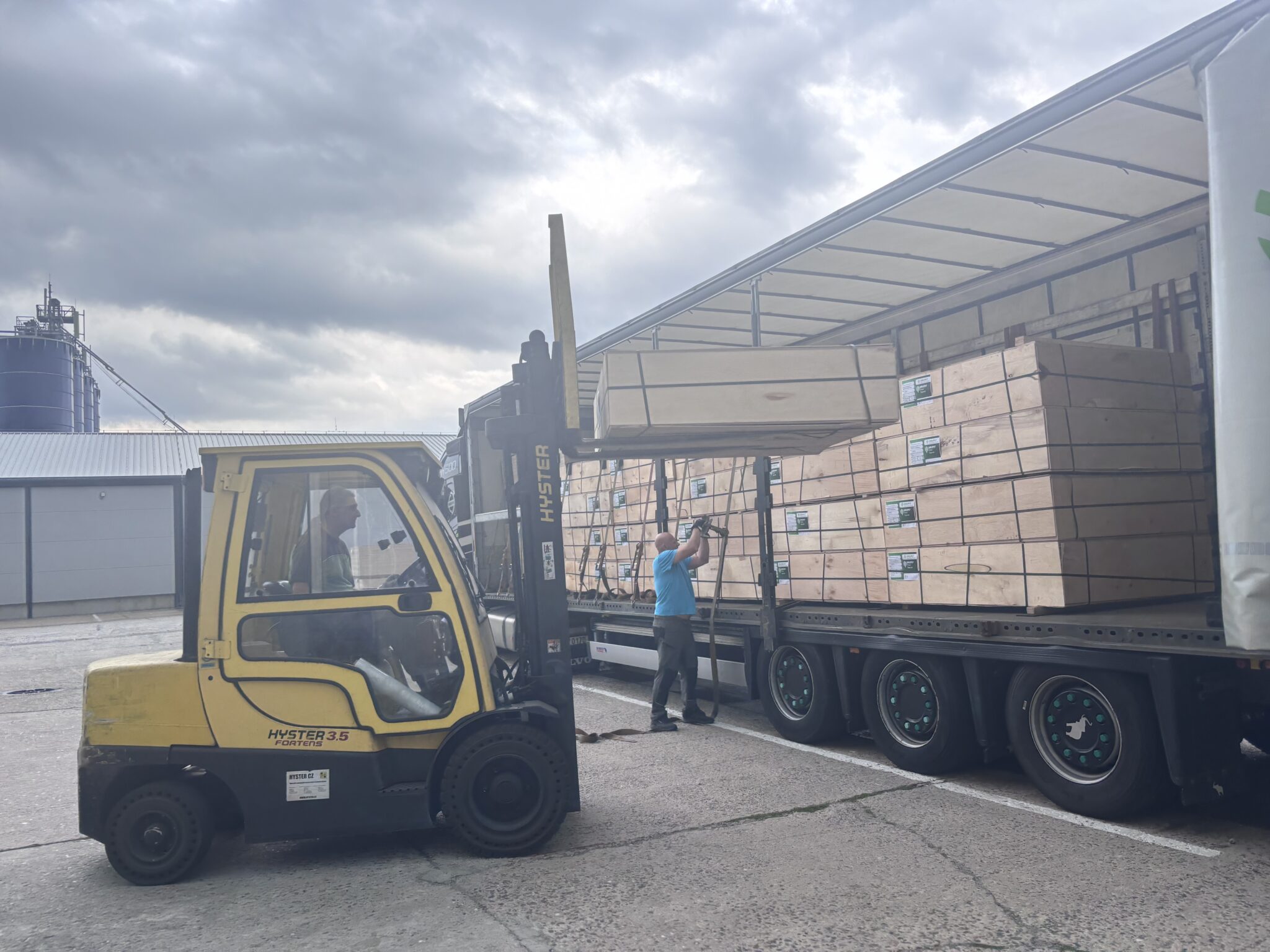
Loading plywood onto a truck at the Orlimex company premises | Source: investigace.cz
Walking us through stacks of half-finished children’s climbing frames, cribs, and stools is Orlimex co-founder Sergej Pavlovec, a Belarusian in his forties. He stops to greet employees as he passes—one manning a CNC machine, another driving a forklift, a third working at a saw.
The company’s production plant sits in the village near Litomyšl, in the eastern part of Bohemia, roughly halfway between Prague and Brno, where Orlimex also has its headquarters. Today, more than sixty people work there, some of them recruited from Pavlovec’s native Belarus. The company has local branches across Europe in Poland, Germany and the UK.
Pavlovec founded the company in the late 1990s with his father and Czech partners. At the time, he was still living in the Belarusian city of Barysaw, home to one of the region’s plywood plants. “Back then, Orlimex’s business was based entirely on supplies from six Belarusian factories. We didn’t work with Russia at all,” he recalls. Pavlovec moved to the Czech Republic in 2003, and a few years later began sourcing from Russian companies. “In the 2000s, large Russian producers invested in top-quality equipment and started producing goods that no one else could match on price and quality,” he explains.
Russian Birch: Cheap and High-quality
Before the war, Orlimex was among Europe’s largest importers of Russian birch plywood. In 2021, the company accounted for nearly 30 percent of all Russian plywood shipped to the EU.
At the time, Russian suppliers made up more than three-quarters of Orlimex’s total imports. One of its key partners was Sveza, a major Russian plywood conglomerate with which Orlimex began working in the mid-2000s.
Russian plywood, Pavlovec says, has two main advantages: it is cheap, thanks to low costs for raw materials, labor, and energy—and it is high quality. Showing samples of birch, eucalyptus, and poplar plywood, he points out, “Just compare them—look how beautiful the birch is.” And unlike the Baltics or Finland, Russia has vast expanses of birch forest.
Orlimex’s customers include suppliers to the Swedish furniture giant IKEA, with its plywood used in many sofa beds, shelves, and tables. Neither IKEA’s Czech nor Swedish press offices responded to requests for comment before publication.
Ethics vs. Business
Although Pavlovec is a vocal critic of Belarusian dictator Alexander Lukashenko and an opponent of Russia’s current government—he even returned to Belarus in 2020 to join protests after the contested elections—he initially saw no problem with sourcing from Russia.
“I strictly separate my personal views from my responsibilities as head of the company,” he says, adding that he would never want to lay off workers just to uphold his personal political principles.
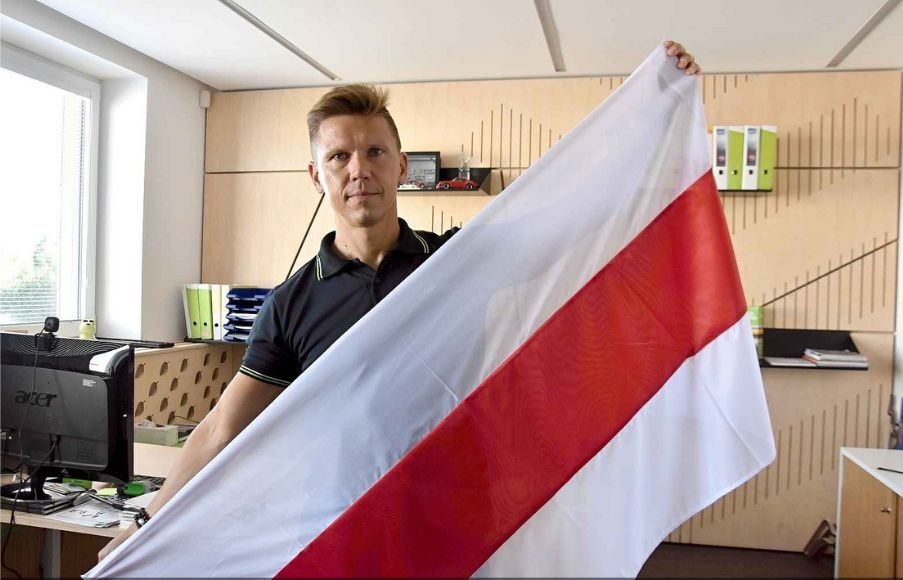
Olimpex co-founder Sergei Pavlovets with the flag of the Belarusian opposition | Source: Sergej Pavlovec Archive
Nevertheless, Orlimex stopped buying Russian plywood two weeks after the invasion began.
In March 2022, the EU imposed sanctions on Alexey Mordashov, then the majority owner of Sveza and one of Orlimex’s key partners. Mordashov, one of the oligarchs summoned to meet with Putin on the day of the invasion, called the war “a tragedy of two brotherly nations,” but never condemned it. He is also chairman and majority shareholder of Severstal, one of Russia’s largest steel and mining conglomerates, which produces steel for tanks and submarines.
That summer, sanctions were expanded to cover all imports of Russian and Belarusian timber. Under the EU Timber Regulation, it is currently impossible to prove the legal origin of wood harvested in Russia, making imports of any Russian wood products—including plywood—prohibited.
“During those months when everyone knew sanctions were coming, companies stocked up. Prices rose by tens of percent,” Pavlovec recalls. Orlimex still owes money to Sveza, but sanctions make repayment impossible. “Financial transactions with Russia are blocked. There’s no way to pay them,” he explains.
Kazakhstan as a Workaround
One of Orlimex’s warehouses is stacked floor-to-ceiling with pallets of plywood. The labels show suppliers from Ukraine, Latvia, Estonia, Georgia, Kazakhstan—and even Russia. Several pallets are stamped “Segezha Group,” marking their source as one of Russia’s largest timber companies. “These are pre-war stocks,” Pavlovec insists, pointing to the dates on the labels.
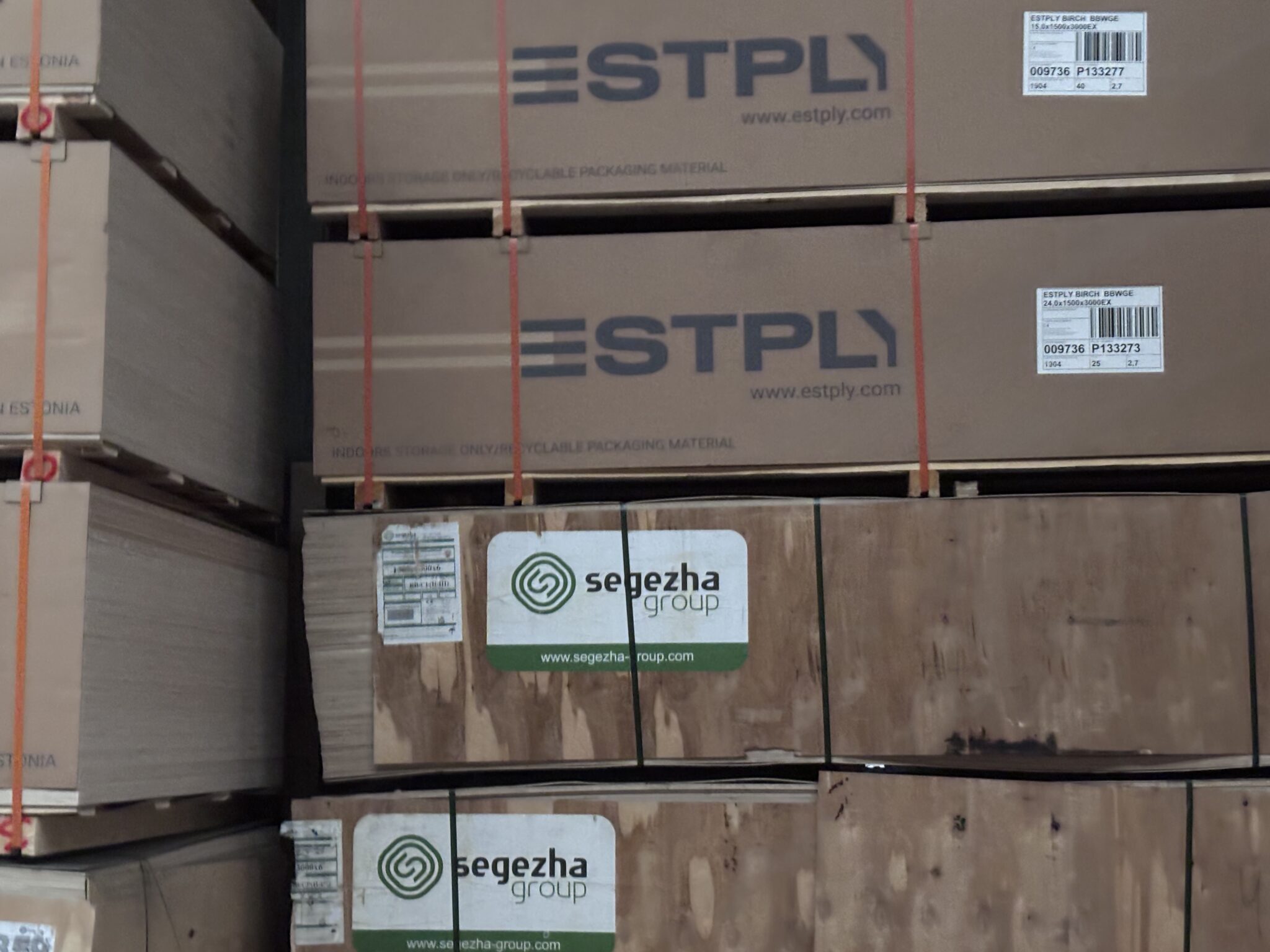
Pallets with plywood from Russian supplier Segezha Group in the Orlimex warehouse | Source: investigace.cz
Orlimex began working with a Kazakh supplier, SFK (Northern Plywood Combine), in 2021 after anti-dumping duties pushed up the price of Russian birch. The factory, located on the Kazakh–Russian border, was launched with government support and is owned by Turkish businessman Celik Oguzhan. In September 2024, Orlimex staff visited the plant. “We saw all the necessary equipment in operation—peeling machines, dryers, presses, sanders, a laminating line. They showed us original Kazakh logging documents in line with EU requirements, and even took us to the forest where the timber is cut. We have photos with GPS coordinates,” Pavlovec says.
But reports from early 2022 in the Kazakh press told a different story: the factory was running out of wood. “About 60 percent of the raw materials are imported, the rest local. This year, the Ministry of Ecology began a ten-year forest inventory. No new logging tenders will be issued, so the factory will have to import 100 percent of its wood,” said a local chamber of commerce official at the time.
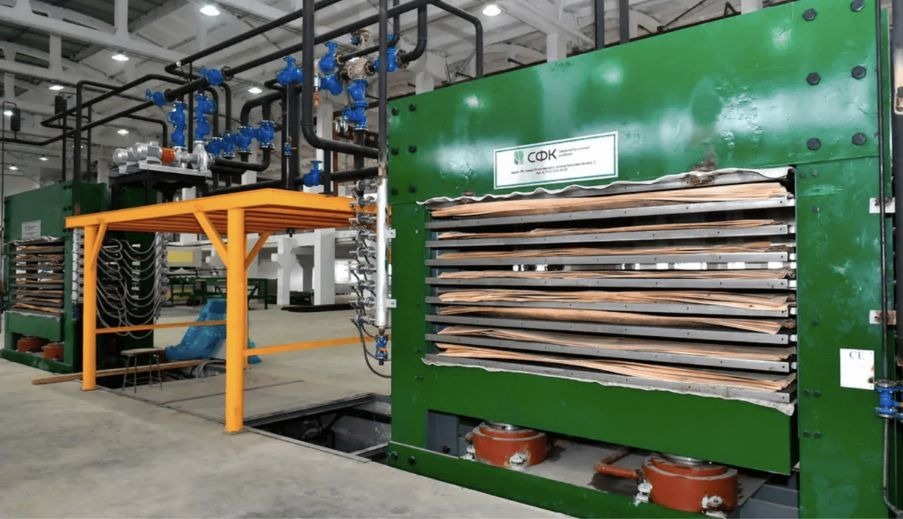
SFK production hall in Kazakhstan | Source: SFK
Export records back this up. SFK has been sourcing birch from Russia, mainly from a supplier in nearby Omsk—also owned by Oguzhan. Pavlovec says he was unaware of this Russian connection. Later, he added in an email that the Russian company was liquidated in 2024. Yet Russia’s financial registry shows it posted timber sales worth 13.5 million rubles (about €140,000) as recently as 2023 and it is still active.
Circumvention or Gray Zone?
In May 2024, the European Commission imposed anti-dumping duties on all plywood from Kazakhstan and Turkey, citing suspicions of sanctions evasion. SFK applied for an exemption but was denied.
Investigators found that some of SFK’s products had been falsely labeled as Kazakh in origin instead of Russian. The company blamed clerical errors, but the Commission dismissed its explanations as unreliable.
Trade statistics reinforced the suspicion. Between 2022 and 2023 and after sanctions on Russian timber, EU imports of Kazakh plywood jumped from zero to nearly 100,000 cubic meters —around 3,000 truckloads. At the same time, Russia’s plywood exports to Kazakhstan rose from nothing in 2021 to 275,000 cubic meters in 2022–23.
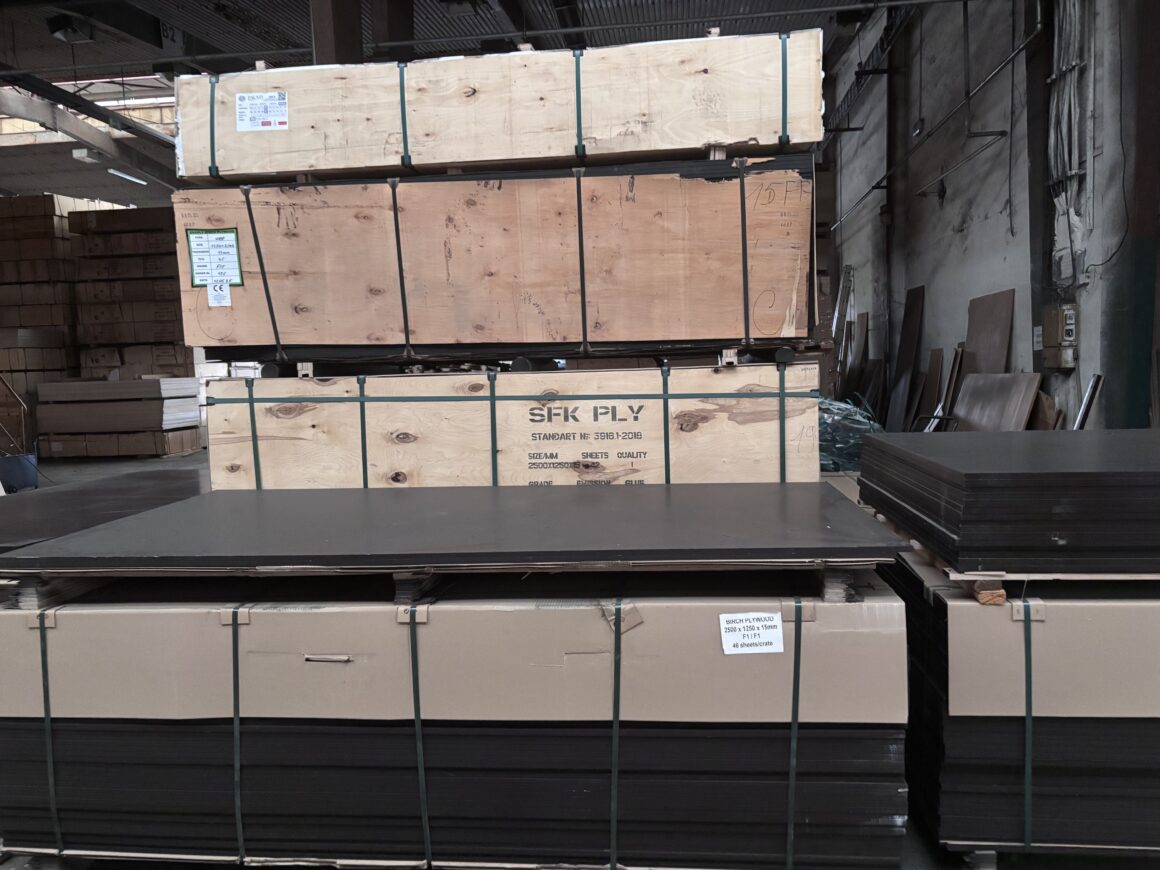
Pallets with plywood from Kazakh supplier SFK in the Orlimex warehouse | Source: investigace.cz
Orlimex continues to buy from SFK, though at lower volumes. Pavlovec insists he is not buying Russian wood, but even if he were, he argues it wouldn’t breach sanctions. “EU sanctions apply to specific customs codes, including plywood. But during manufacturing, the customs code changes, and the country of origin becomes the third country. In that case, sanctions don’t apply,” he says.
The Czech Ministry of Finance disagrees. Asked about scenarios where Russian veneer or timber is processed into plywood in Kazakhstan or Georgia and then exported to the EU, a spokesperson said: “Sanctions on Russian timber are broad. Any import, direct or indirect, is banned. That includes both raw wood and wood products. Such cases are very likely violations of sanctions.”
Russian Managers, Russian Wood in Georgia
In 2023, Orlimex began sourcing from Palati, a Georgian company founded after the war began. Palati is the only Georgian exporter of birch plywood to the EU according to our reporting partners at iFact in Tbilisi.
Part of Palati’s management previously worked at the Russian plywood firm Starwood NN. Despite this, Pavlovec describes the risk of Palati using Russian wood as “minimal,” claiming the company’s owners are Georgian and that they use Latvian birch. He says he has personally toured the factory, met with managers and the owner, and that Orlimex staff regularly travel there to verify documents, production capacity, and raw material stocks.
But trade data suggests otherwise. According to the Volza export database, not only Palati’s management but also much of its raw material comes from Starwood. iFact reporters found that Starwood sources plywood from a company in Nizhny Novgorod controlled by city council members from Putin’s United Russia party.
Video: Employees of the British non-profit organization Earthsight visited the Palati factory undercover. Source: Earthsight
The numbers don’t add up. Latvia exported only about 1,650 cubic meters of veneer to Georgia in 2024—enough for 1,500 cubic meters of plywood. Yet Georgia exported roughly 26,500 cubic meters of plywood to the EU that same year. Even if Latvia’s earlier deliveries were included, the gap strongly suggests that Russian wood is being used.
Earthsight, a UK-based NGO, reached similar conclusions. Its undercover investigators visited Palati’s factory, where employees admitted that some of the wood came from Russia. “If your authorities need documents under EU rules, we’ll provide papers where Russia doesn’t appear,” one Palati representative told them, adding that EU customs rarely demand certificates of origin.
Orlimex suspended purchases from Palati in August 2024, pending the rollout of the EU’s new deforestation regulation (EUDR), which requires importers to provide GPS coordinates for timber harvest sites. “We hope Palati will be able to comply,” says Pavlovec.
Palati declined our colleagues at Georgia’s iFact’s request for an interview.
A special Status
Since 2023, Palati has held “approved exporter” status, granted under a 2016 EU–Georgia trade agreement. This allows the company to self-certify the origin of its products, giving it preferential customs treatment. Investigace.cz has seen documents confirming this status.
Source: Earthsight
Georgian experts warn that weak oversight could turn this mechanism into a tool for sanctions evasion. “With wine, there’s no risk. But with timber, the raw material comes from Russia. Companies with this status could act as re-exporters and falsify origins, damaging Georgia’s international reputation if exposed,” economist Ramaz Gerliani told iFact.
The European Commission declined to respond as to whether “approved exporter” status could be abused to circumvent sanctions. “No comment” was the answer.
This original version of this article was published in Czech on Investigace cz.
Subscribe to Goulash, our original VSquare newsletter that delivers the best investigative journalism from Central Europe straight to your inbox!

